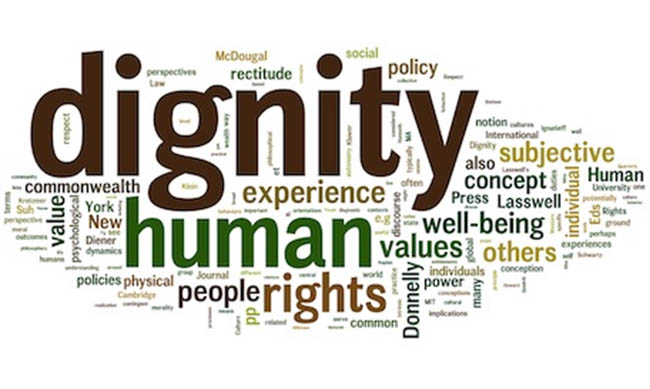Recognition of the “inherent dignity” of mankind “is the foundation of freedom, justice and peace in the world” and all members of human family are equal in dignity and rights regardless of their religious, racial, or sexual backgrounds. The equal and inalienable rights of human beings originate from their inherent dignity. That is to say, human dignity is known as the basis of human rights in “The Convention Against Torture and Other Cruel, Inhuman or Degrading Treatment or Punishment”.
Human dignity is inviolable and no individual or state is allowed to humiliate one through torturing or discriminating them. The principles of Human Rights and International Humanitarian Law (IHL) seek to protect human rights, dignity, and values. According to Immanuel Kant, one has to treat people as “Principle of the End” rather than an object or instrument. Therefore, humiliating acts such as slavery, torture, human trafficking, racial discrimination, etc. are allowed at no circumstances. Similarly, inflicting unnecessary sufferings upon people during the conflicts, using chemical weapons, resorting to mutilation or genocide are strictly banned for violating human rights which are based on dignity.
On the other hand, pornography, prostitution, rape, and reproductive cloning of human being will reduce mankind from Supreme Creature to object. In addition to threatening families and society, reproductive cloning is contrary to human dignity since it changes people into objects. It further results in mental and physical harms and disintegrates families.
There are a number of intra-cultural and universal principles. For example, violating one’s rights to life and liberty, killing non-combatants during the conflict, torturing one mentally or physically, humiliating, etc. are forbidden in all cultures. No culture will back slavery, human trafficking, racism, unfair prosecution or treatment.
Despite this fact, humanitarian law has been widely transgressed around the world. The harsh practices of Serbs in Bosnia and Herzegovina were likened to the atrocities and killings carried out by Nazis in Second World War. The acts of Serbs contained genocide, sexual violence, systematic killings and bombings, inflicting hunger and thirst on civilians, etc. Inhuman acts in Yugoslavia and Rwanda were highly offensive. In the same way, a large number of prisoners were degraded and tortured in the worst possible way in Abu Ghoraib prison, where naked prisoners were piled in triangular form.
Human dignity is inviolable and inalienable and more significant than one’s right to life. For example, one will be sentenced to death on the basis of law or allowed to be killed in war, but will never be allowed to be degraded. Even degrading human body is considered crime. Based on the principle of dignity, all members of human family must be respected for being human regardless of their distinction. One’s dignity must be protected even if s/he is criminal, political foe, merciless killer, and so on.
Natural rights are the second basis of human rights. Thomas Aquinas, a natural law theorist believes that natural rights are universal, unchangeable, and in accordance with human nature for being ethical and reasonable. He divided law into three categories: “Divine Law”, the “Natural Law” and “Human Law”. Natural law, according to him, is perpetual, universal and belongs to all in any time and place and everyone is able to realize it based on the level of their ability. So, the universal human rights root in natural rights.
However, Grotius asserted that human nature is the mother of natural law, and that it would operate even if God did not exist. This idea reflects the modern and secular approach to natural rights. Natural rights are traced to more than 20 centuries back and existed in both religious and secular traditions. The followers of this school of thought say that human laws stem from natural law and in case of being contradictory, human laws will attach no importance.
According to moral principles, all human beings are born equal and one’s rights and dignity should be valued simply for being human. Based on this fact, human dignity is universal and perpetual.
To sum up, there are three bases for human rights: First, human dignity which means that the rights of human beings should be respected since, unlike other living things, they have dignity. Second, natural rights suggest that human beings are “endowed with reason and conscience” and there is a set of rights in accordance with human nature to be protected. Ethical code is the third basis which says that people need to be respected for being human and have to practice upon “Golden Rule”. Indeed, human dignity, which is inalienable and inviolable, is the cornerstone of human rights. Human societies will have to support human dignity more than ever before so as to promote peace and prosperity.
Home » Opinion » Human Dignity – The Cornerstone of Human Rights
Human Dignity – The Cornerstone of Human Rights
| Hujjatullah Zia

